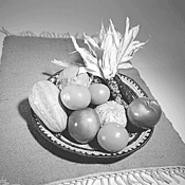"This is an opportunity to gather together and celebrate the good that's happened," says Eldridge, assistant director of the Lorain Public Library. "You try to pull out things that are positive and break bread with others." On Thursday, December 27, a potluck Kwanzaa dinner - sponsored by Maliyeta, a summer education program at Cleveland State University for ages 6 to 16 - will be served at the Cleveland School of the Arts. "We feel the exchange of food is an important part of Kwanzaa," says Sanza Clarke, the program's director. "It's our way of giving back to the community."
In 1966, Maulana Ron Karenga, a Los Angeles college professor, created Kwanzaa because African Americans had no holiday to call their own. Each day through January 1, the principles of unity, self-determination, responsibility, cooperative economics, purpose, creativity, and faith are commemorated. Initially, private Kwanzaa feasts were held inside homes. By the late 1970s, public gatherings became more commonplace in metropolitan areas. Eldridge is one of thousands in Cleveland who has celebrated since then. Every Kwanzaa, she brings out the pots and pans to prepare a meal for 10 guests. The banquet often includes fried fish, peppered chicken, candied yams, greens, cornbread, and sweet potato pie, but almost any type of food is suitable. "In fact," she says, "someday I might get even more creative. Maybe I'll have a dinner with Jamaican or Thai cuisine."
At the potluck celebration Thursday, Clarke says, there will be two dinner lines: one for people with strict vegetarian diets, the other for folks who eat everything but pork. "We have many in our community who are Muslim, and their diets restrict them from eating it," she explains. Also expect such holiday favorites as fried okra, green peppers, and spinach; peanut soup; black-eyed peas; and benne cakes.
Just as there is symbolism and correlation between the food and the holiday, Kwanzaa has a longstanding relationship with Christmas. Holiday trees are trimmed in gold and black (the colors of Africa), as well as traditional green and red. And African masks and ornaments rest beside Christmas decorations in many homes.
Thursday's event will include a children's choir, drum corps, and vendors peddling handmade jewelry, clothing, artwork, and CDs. By the end of the evening, Clarke predicts, everyone should feel more in tune with African American heritage.
"Once you define yourself," she says, "you can't help but to become more empowered."


